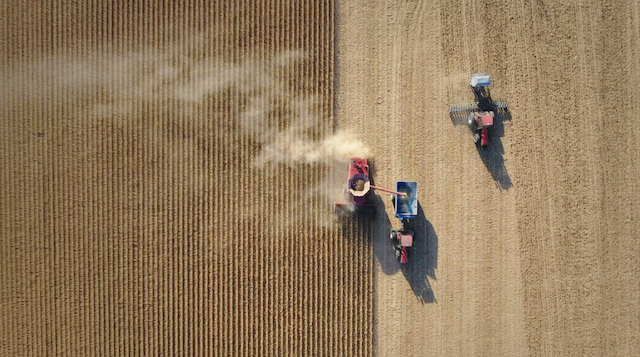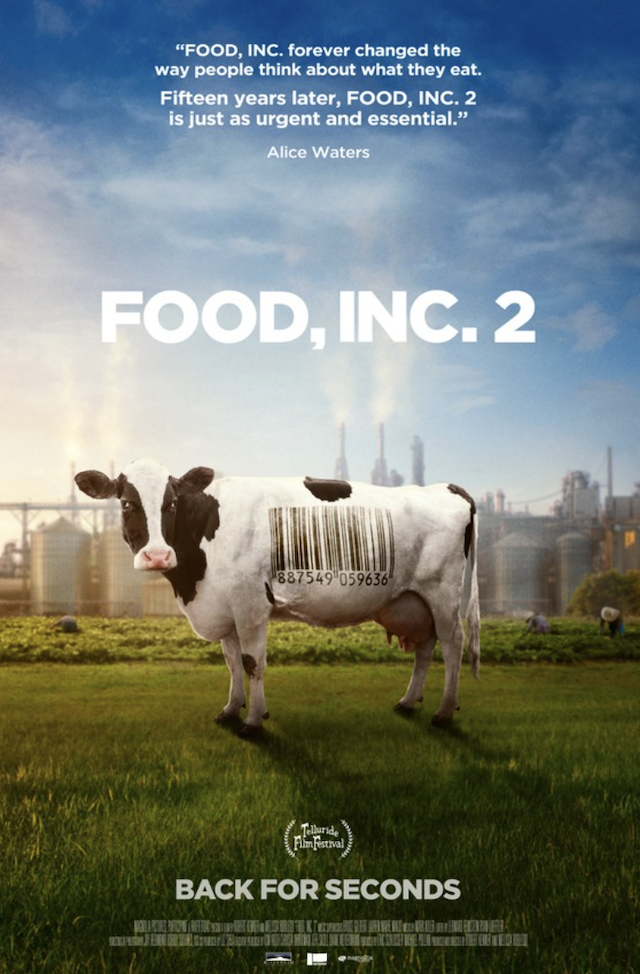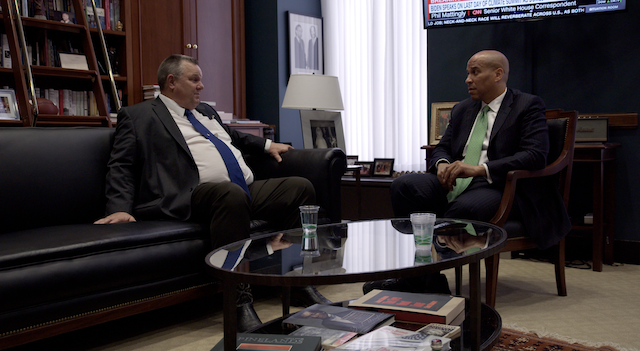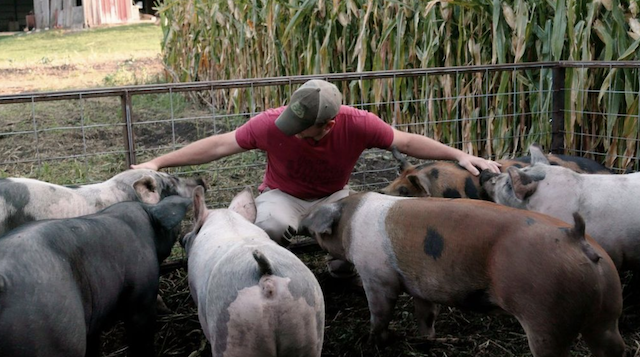
©Courtesy of Magnolia Pictures
FOOD, INC. 2 is a timely and urgent follow-up to the Oscar®-nominated documentary from directors Robert Kenner and Melissa Robledo. In the sequel, Kenner and Robledo reunite with investigative authors Michael Pollan (The Omnivore’s Dilemma) and Eric Schlosser (Fast Food Nation) to take a fresh look at our vulnerable food system. The groundbreaking FOOD, INC. ignited a cultural conversation about the multinational corporations that control our food system at enormous cost to our planet, workforce, and health. FOOD, INC. 2 comes “back for seconds” to reveal how corporate consolidation has gone unchecked by our government, leaving us with a highly efficient yet shockingly vulnerable food system dedicated only towards increasing profits. Seeking solutions, the film introduces innovative farmers, food producers, workers’ rights activists, and prominent legislators such as U.S. Senators Cory Booker and Jon Tester, who are facing these companies head-on and fighting to create a more sustainable future.
Genre: Documentary
Original Language: English
Director: Robert Kenner, Melissa Robledo
Producer: Michael Pollan, Eric Schlosser, Robert Kenner, Melissa Robledo
Release Date (Theaters): Limited
Release Date (Streaming):
Runtime:
Distributor:Magnolia Pictures
Production Co: Participant, River Road Entertainment

Exclusive Interview with Directors Melissa Robeledo and Robert Kenner
Q: Your previous film “Food Inc.” — which came out like 16 years ago — affected a lot of people. At the same time, it opened up the eyes of people who weren’t previously concerned about what they were eating. What was the reason that you decided to tackle a sequel after these many years later?
Robert Kenner: As filmmakers, what’s really fun is the thrill of making a film about a subject you don’t know anything about, and entering into it like you’re a viewer. So, the idea of doing a sequel was not something that really appealed to us. We had been approached a few different times to do so but we’re filmmakers and we don’t necessarily make films about food. When the pandemic hit, it just exposed the brutality of this consolidated system to a point that was just frightening and infuriating, and it wasn’t about the pandemic.
It just showed what was going on, in a more extreme way since when we made the first film, and continues to go on today. When you see workers sent into these plants, knowing that they were going to be getting COVID and spreading it throughout the community, these companies didn’t care because they just wanted to get their pigs to slaughter before they got too fat to fit into the slots there.
When you had managers betting on how many people were going to die that week at the plant, or you had tomato workers who weren’t allowed to be tested for COVID, it just exposed the dangers of this system. It went on from there to show that ultimately, the food that these people are producing, this new ultra-processed food that seems to be taking over more and more of the supermarket, is also dangerous for the eater. It’s paying farmers less, destroying the farmland, and making people sicker and sicker. It seemed to be a reason to enter into this field again, come back and make this film.
Q: That’s a great decision, but with all these kids having diabetes these days, how much do you think that ultra-processed food has changed the landscape of America and what people eat for the last decade?
Melissa Robeledo: I would just say it’s been a hugely significant impact.
Robert Kenner: In the first film we talked about how lower-income people were eating a lot of sugar, salt, and fat because it was being subsidized and was a lot cheaper. In the United States, two-thirds of our calories are coming from ultra-processed food, and these studies are showing that this food is basically addictive; it’s going to be harder for companies to put on their packages, “this has less sugar, this has less salt.” You can’t say something is less ultra-processed. They’re going to have a very difficult time, and they’ll probably come up with a false campaign to explain why ultra-processed is good for us. These companies have become very good at marketing, and they know how to confuse the eater. We thought it was our job to help show the dangers of this new food.
Melissa Robeledo: There’s a huge body of research showing the correlation between a diet high in ultra-processed foods an something like 32 different diseases. There’s research backing all that up.
Q: It’s really devastating to see the conditions in the Tyson Fresh Meat factory in Waterloo, Iowa. People are working with no masks, some are puking in the background By the end of the month, many people got infected with COVID. How did the situation get so bad and what did you think about John Tyson’s letter to the President, his response and the executive orders?
Robert: It was outrageous. the Defense Production Act is there to make companies do what’s good for the country, not what’s good for the corporation and making profits. They sent workers back to work without many proper safety precautions. We interviewed government employees who were supposed to be protecting the plants, and they wanted to wear masks; they were told by the company they weren’t allowed to wear masks in the factory, because it set a bad example to the other workers. Some of those OSHA employees got COVID and died. it was the corruption of the political system that was really as interesting and as important as anything else that we were witnessing in this film, and that’s one of the differences between this film and the last film.

Courtesy of Magnolia Pictures
Q: It’s interesting to look at why major companies buy up all the competitors. They don’t want to compete but, on the flip side, when they don’t have competition, the consumer has to pay more due to the monopolization. The farmer and rancher get paid less, particularly the people who consume daily-based products such as beef, cold cereal, or baby formula — so they have less to spend. What kind of political approach do we need to change those systems? President Biden has a strong team on antitrust, both in the FTC and the Justice Department. Talk about your viewpoint on this?
Melissa Robeledo: Yes, that’s true. He’s done a really good job, and Lina Kahn at the FTC has been particularly proactive. Recently, they sued to block the merger of Kroger and Albertsons, so we are seeing some enforcement of the antitrust laws we already have on the books. I think we’re seeing an interest on both sides of the aisle in Congress to pursue these measures or these protections in many industries. Our hope is that the food industry becomes a focus of some of those efforts.
Q: It’s really surprising to know that the minimum wage in the United States hasn’t been going up since 2009. It still remains like $7.25 or something. Talk about the minimum wage and your view on raising it?
Robert Kenner: It’s just shocking. The little lady who works at Taco Bell, my old friend, she could work one or two jobs for more than 40 hours a week and not make enough to live on, and not be able to afford seeing a doctor as an adult. Something is wrong if people are working hard and can’t survive.
I was just in Denmark, and I’m told workers at McDonald’s get paid good wages. In our country, so many of these jobs are so low paying that no matter how hard they’re working, people can’t survive. One of the things that’s interesting is that we have such an ambiguous feeling — there’s such hostility towards immigrants in this country, yet we couldn’t survive without them.
These factories couldn’t exist because no American wants these jobs. There are very few. They’re just brutal jobs, and most of them are going to people not from the South but to people from civil war-torn countries, people who are absolutely desperate take these jobs, and it just feels like something is off, that we have this kind of a system.
Q: It’s so ironic that the CEO of Yum! Brands — the company which owns the Taco Bell — makes more money in an hour than what a typical Taco Bell worker makes in a year. That’s not just ironic, it’s ridiculous.
Robert Kenner: That’s true for almost all of these industries. That was just one example. That’s certainly true of McDonald’s. You can go on and on.
Melissa Robeledo: The fast food industry really fights against raising the minimum wage, claiming these are jobs for teenagers, when, in fact, the average worker at a fast food company is a mom, like a 35-year-old mom, I think. It’s not a teenager. Let’s just put it that way.

©Courtesy of Magnolia Pictures
Q: Compared to some of the Asian countries, American men don’t cook often, and it hasn’t changed much in the last decade. That’s part of the reason that Americans consume so much ultra-processed food. What are the approaches that we can use to make men cook more, or make the younger generation get interested in cooking?
Robert Kenner: Americans don’t have a food culture like France or Japan. We don’t have the same traditions, so we became vulnerable to these quick foods that can easily be opened and prepared. We become addicted to them once you start eating them; it’s hard to stop. As the Lay’s commercial for potato chips goes, “Bet you can’t eat just one.” That’s their goal, to make it something you can’t stop eating. It’s also profitable for them, and bad for us. Americans are more susceptible to this kind of food, but these companies see the rest of the world as great business opportunities, and they are looking to spread this food to the rest of the world. It will seep in and undermine the food traditions that exist in many places.
Q: The dairy industry moved from Wisconsin to the California desert because the land is cheaper, and there’s less regulation. But moving there caused a drain of water, and many other technical issues. Talk about how that shift of location changed the landscape, and, at the same time, served business on one end, but caused a problem at the other end. Talk about not choosing the right location for the right product to grow or develop.
Melissa Robeledo: It’s exactly because the land was cheap, and regulations were slim to non-existent. We started growing alfalfa for Saudi Arabia in the Arizona desert, draining the water and aquifers there. Companies who could drill the biggest well got the most water, and the same was true for the dairy industry there, but it doesn’t make sense ecologically.
Robert Kenner: We spoke to people who had lived in these towns, bought houses and then, no longer have water. Again, it’s about the lack of regulations that allow companies to do what they want and not pay the fair price. You’re not allowed to dump your garbage in the street, but these people basically are dumping their garbage in the air and in the sewers and are poisoning the people in Iowa who can’t go near their lakes that were once beautiful — where they used to swim as kids — because they’re totally polluted. Again, it’s basically powerful corporations being able to undermine the democratic system.
Check out more of Nobuhiro’s Articles.
Here’s the trailer of the film.

